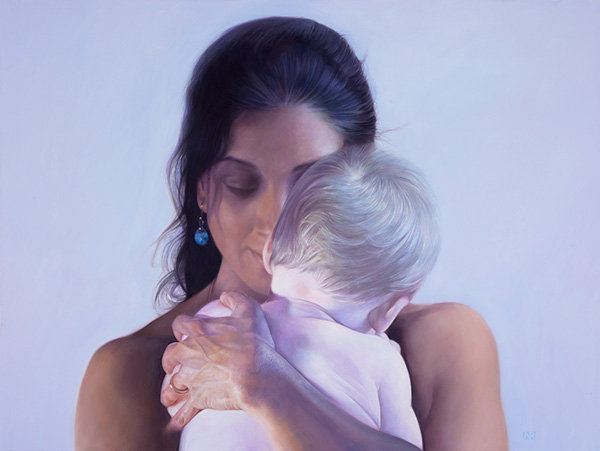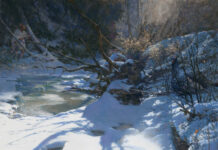From the West Coast to the East Coast and back, accomplished artist John Rowe has done just about everything to establish a successful career. Supporting a family through major commissions as an illustrator, Rowe continues his epic journey by exploring more deeply how fine art can communicate what words cannot.
The story of artist John Rowe’s career reads like Homer’s Odyssey — filled with triumph, love, deception, failure, and so much more. Like many before him, Rowe’s odyssey began when he was a child. The artist recalls how he had trouble putting down the pencil — how he was constantly observing the world and musing on how to represent it on paper. As a budding artist, Rowe’s formal training began at Cal State LA, where Al Fiori encouraged him to go to Art Center. Rowe recalls, “My first attempt at a student loan fell through, so I worked two full-time jobs to raise tuition and work my way through school. After school, I sold my belongings and took a Greyhound bus to New York City with $600 to my name.”
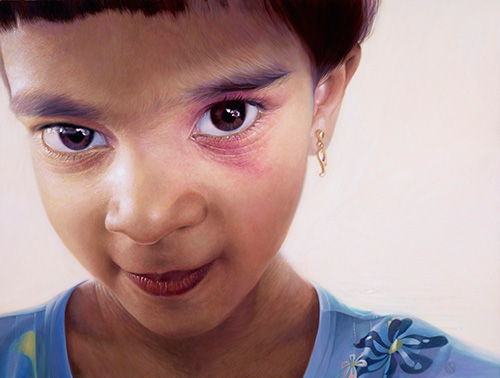
John Rowe, “Make-up,” 2015, oil on canvas, 30 x 40 in. (c) John Rowe 2016
In the “City That Never Sleeps,” Rowe found himself being pushed into roles that didn’t provide the creative outlet he desired, so he took the plunge and resigned his role at an ad agency and began painting full-time. The move proved pivotal for Rowe, who relocated to Los Angeles and was quickly noticed by Disney for his illustrative talent. He writes, “Over the years I have been lucky enough to be able to support my family through commissions from Disney, the United Nations, and National Geographic. I was the president of the Society of Illustrators in Los Angeles for a few years as well. I’ve had lots of fun as a guest artist on cruise ships and learned a lot from many talented people. I feel like I am finally learning how to paint decently and my current work just might have something to offer. Mostly I am very grateful to be able to do what I love and have so much fun making art.”
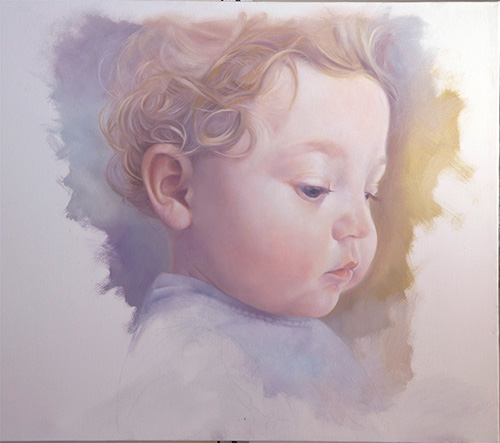
John Rowe, “Baby Study,” oil on canvas, 18 x 24 in. (c) John Rowe 2016
The range of Rowe’s work is stunning — and inspirational. While many artists hone their skills on portraiture, landscape, still life, and figurative subjects, Rowe has done it all, from book illustration to movie posters, traditional subjects, and beyond. “I never set out to create artworks in such a wide range,” he says, “but I was very determined to earn my living creating art and accepted almost any project that would accomplish that at the beginning. The wide variety of work I was offered defined its own path. Besides, everything in life is so interesting. To me, everywhere you turn, there is wonder and amazement worth studying, worth painting, worth thinking about. Over time I have been letting the subjects that hold my interest the least go and used personal works to evolve in directions that are meaningful to me.”
Rowe’s recently completed “Her Gift” is a terrific — and gorgeous — example of his new direction. Amidst a soothing solid background, the viewer is presented with two subjects: a brown and dark-haired mother tenderly grasping a pale-skinned infant. Albeit simple in subject, the piece bursts with emotional and interpretive potential. The piece has a very special meaning to the artist, made palpable through his description. The artist writes, “The painting of my wife and our foster child — who has since been returned to his family — is still very close to me. I watched my wife over months give her love and strength and protection to this child. Tears, joy, fierce protection, devotion, sleepless nights — all while knowing she might never see him again but that he would carry the sense of being loved unconditionally into his future life and it would become a foundation for him. We had taken classes to learn about how those first relationships can lay a groundwork for the core of who you become. I wanted the differences in hair, skin, and ethnicity to be apparent and for the emotional connection between her and the baby to be strong enough to make that completely irrelevant. I wanted to leave the viewer with the feeling of profound love that only a mother can have for her child.
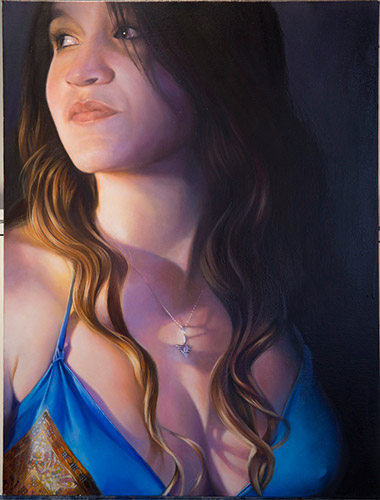
John Rowe, “Stephanie,” 2015, oil on canvas, 18 x 24 in. (c) John Rowe 2016
“We did a photo shoot at my studio, and I combined several different shots together. I closed her eyes to give the composition a feeling of peace and began painting. To me one of the most important parts was her hand. Each finger held the baby differently: from the talon-like security of her thumb and forefinger griping him, to the gentle touch of her ring finger and pinky left floating in space half touching and half letting go, as she would eventually have to do. I painted my wife’s face out of focus so other mothers could relate to her and not become too specific. The child’s fine hair was represented as real as possible so the viewer could relate to the fragile nature and delicate features of a baby.”
Rowe hopes to continue producing paintings such as “Her Gift” for gallery spaces into the future. After spending a long career creating illustrations for major publishers, Rowe endeavors to create artworks that are meaningful to his viewers and collectors. He concludes, “I think if I am able to do that from time to time during the rest of my career that is what would make me happy.”
To learn more, visit John Rowe.
This article was featured in Fine Art Today, a weekly e-newsletter from Fine Art Connoisseur magazine. To start receiving Fine Art Today for free, click here.

